人教版七下Unit 8 It's raining. section B 精讲精练(重点词汇+句型+课堂练习)(含解析)
文档属性
| 名称 | 人教版七下Unit 8 It's raining. section B 精讲精练(重点词汇+句型+课堂练习)(含解析) |
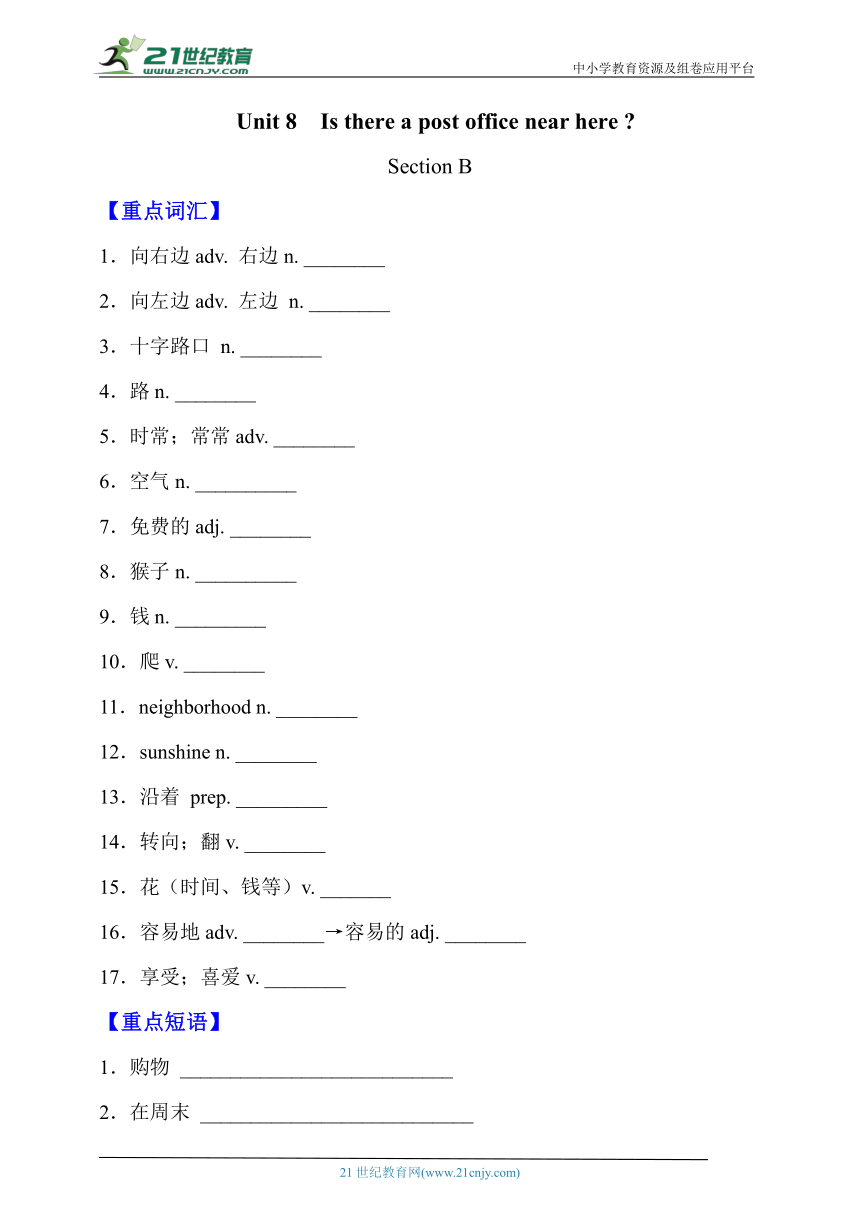
|
|
| 格式 | docx | ||
| 文件大小 | 386.5KB | ||
| 资源类型 | 试卷 | ||
| 版本资源 | 人教新目标(Go for it)版 | ||
| 科目 | 英语 | ||
| 更新时间 | 2024-03-22 14:02:31 | ||
图片预览

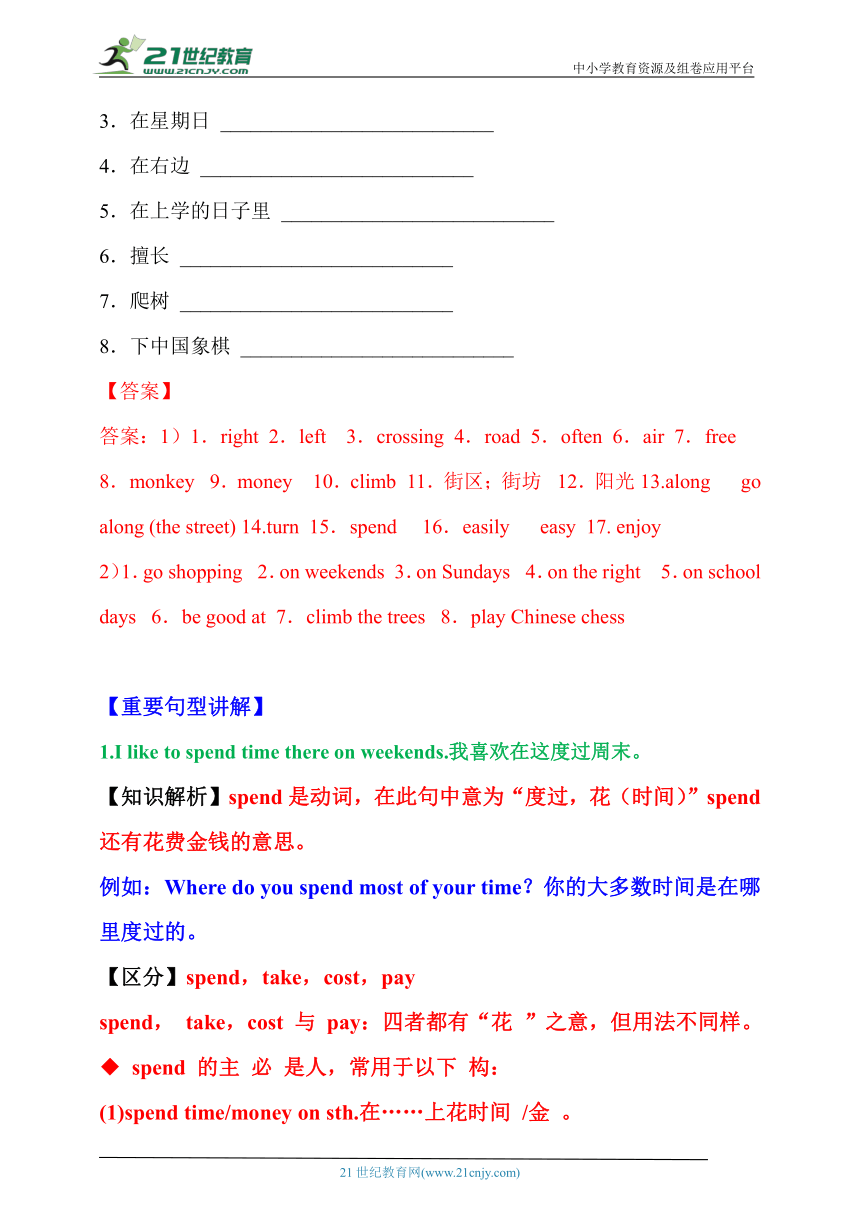
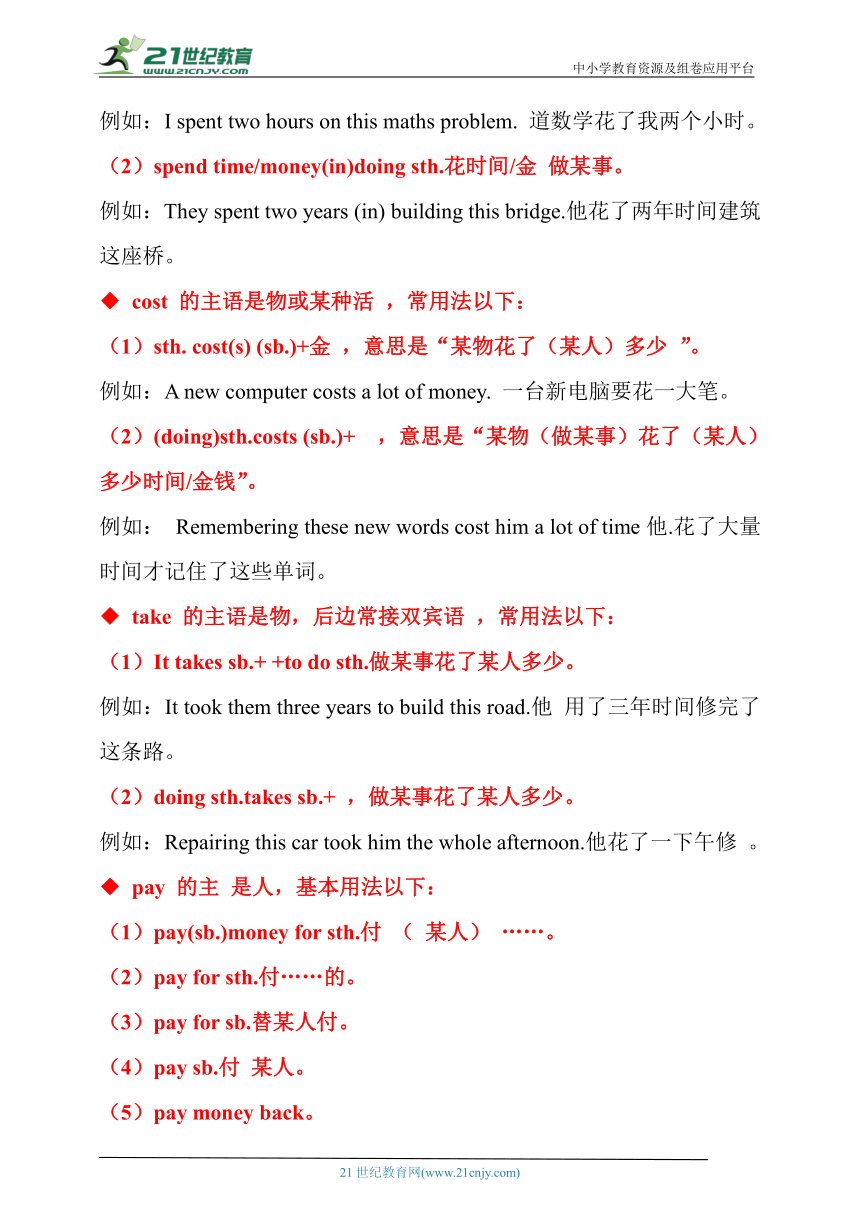
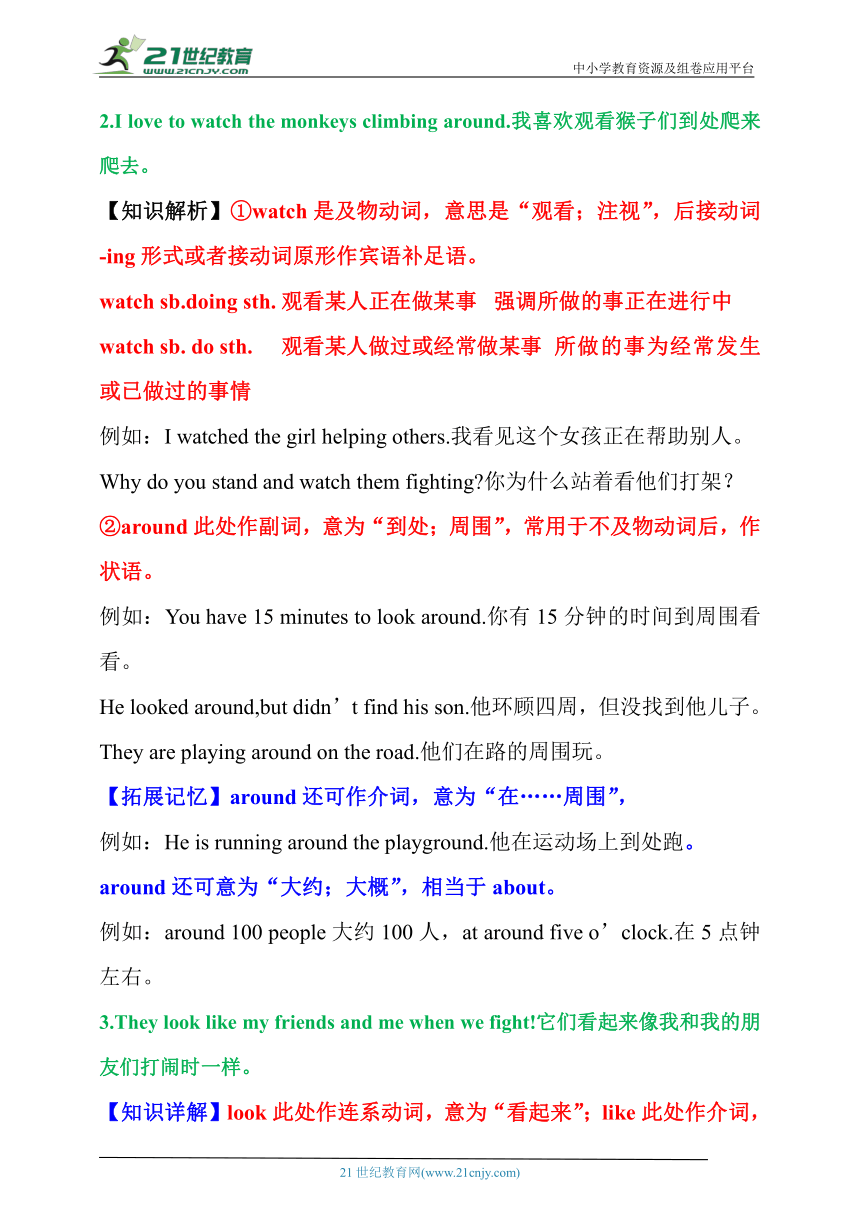
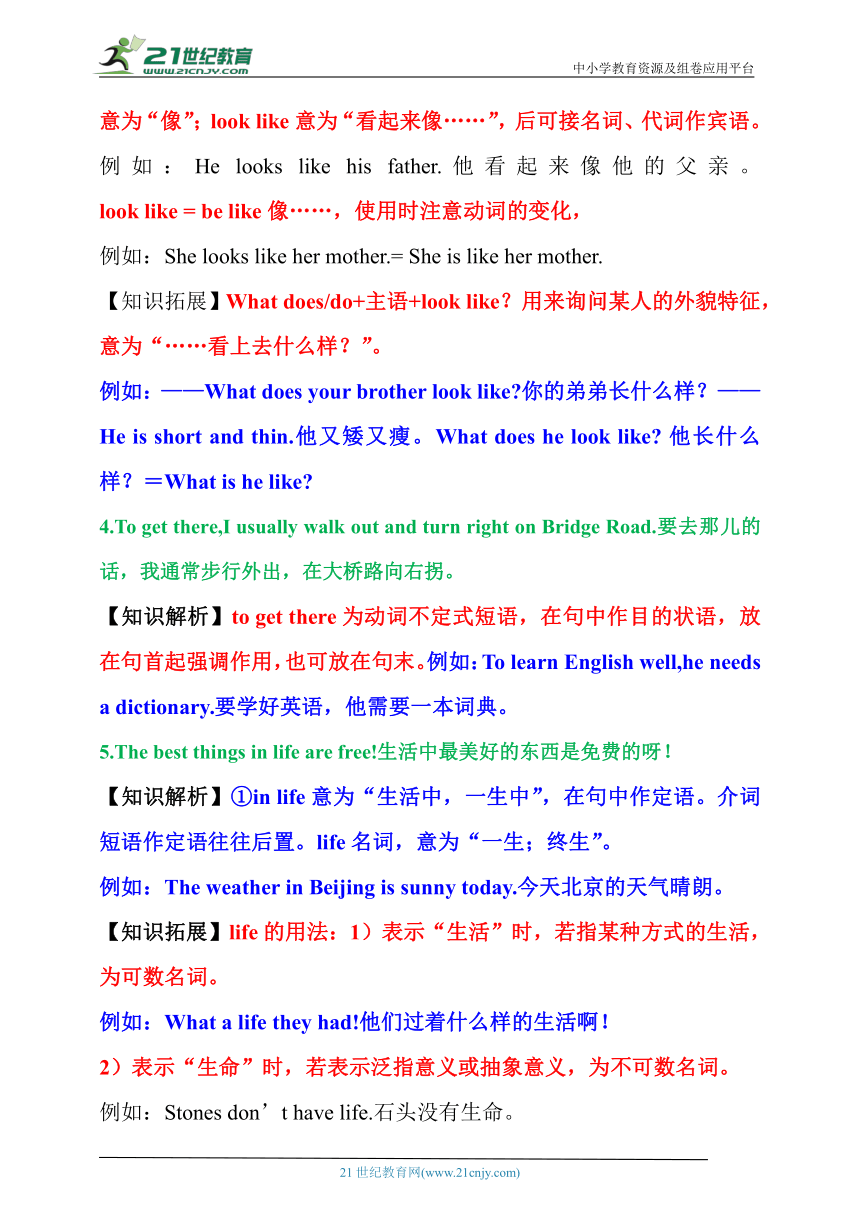
文档简介
中小学教育资源及组卷应用平台
Unit 8 Is there a post office near here
Section B
【重点词汇】
1.向右边adv. 右边n. ________
2.向左边adv. 左边 n. ________
3.十字路口 n. ________
4.路n. ________
5.时常;常常adv. ________
6.空气n. __________
7.免费的adj. ________
8.猴子n. __________
9.钱n. _________
10.爬v. ________
11.neighborhood n. ________
12.sunshine n. ________
13.沿着 prep. _________
14.转向;翻v. ________
15.花(时间、钱等)v. _______
16.容易地adv. ________→容易的adj. ________
17.享受;喜爱v. ________
【重点短语】
1.购物 ___________________________
2.在周末 ___________________________
3.在星期日 ___________________________
4.在右边 ___________________________
5.在上学的日子里 ___________________________
6.擅长 ___________________________
7.爬树 ___________________________
8.下中国象棋 ___________________________
【答案】
答案:1)1.right 2.left 3.crossing 4.road 5.often 6.air 7.free
monkey 9.money 10.climb 11.街区;街坊 12.阳光13.along go along (the street) 14.turn 15.spend 16.easily easy 17. enjoy
2)1.go shopping 2.on weekends 3.on Sundays 4.on the right 5.on school days 6.be good at 7.climb the trees 8.play Chinese chess
【重要句型讲解】
1.I like to spend time there on weekends.我喜欢在这度过周末。
【知识解析】spend是动词,在此句中意为“度过,花(时间)”spend还有花费金钱的意思。
例如:Where do you spend most of your time?你的大多数时间是在哪里度过的。
【区分】spend,take,cost,pay
spend, take,cost 与 pay:四者都有“花 ”之意,但用法不同样。
◆ spend 的主 必 是人,常用于以下 构:
(1)spend time/money on sth.在……上花时间 /金 。
例如:I spent two hours on this maths problem. 道数学花了我两个小时。
(2)spend time/money(in)doing sth.花时间/金 做某事。
例如:They spent two years (in) building this bridge.他花了两年时间建筑这座桥。
◆ cost 的主语是物或某种活 ,常用法以下:
(1)sth. cost(s) (sb.)+金 ,意思是“某物花了(某人)多少 ”。
例如:A new computer costs a lot of money. 一台新电脑要花一大笔。
(2)(doing)sth.costs (sb.)+ ,意思是“某物(做某事)花了(某人)多少时间/金钱”。
例如: Remembering these new words cost him a lot of time他.花了大量时间才记住了这些单词。
◆ take 的主语是物,后边常接双宾语 ,常用法以下:
(1)It takes sb.+ +to do sth.做某事花了某人多少。
例如:It took them three years to build this road.他 用了三年时间修完了这条路。
(2)doing sth.takes sb.+ ,做某事花了某人多少。
例如:Repairing this car took him the whole afternoon.他花了一下午修 。
◆ pay 的主 是人,基本用法以下:
(1)pay(sb.)money for sth.付 ( 某人) ……。
(2)pay for sth.付……的。
(3)pay for sb.替某人付。
(4)pay sb.付 某人。
(5)pay money back。
2.I love to watch the monkeys climbing around.我喜欢观看猴子们到处爬来爬去。
【知识解析】①watch是及物动词,意思是“观看;注视”,后接动词-ing形式或者接动词原形作宾语补足语。
watch sb.doing sth. 观看某人正在做某事 强调所做的事正在进行中
watch sb. do sth. 观看某人做过或经常做某事 所做的事为经常发生或已做过的事情
例如:I watched the girl helping others.我看见这个女孩正在帮助别人。
Why do you stand and watch them fighting 你为什么站着看他们打架?
②around此处作副词,意为“到处;周围”,常用于不及物动词后,作状语。
例如:You have 15 minutes to look around.你有15分钟的时间到周围看看。
He looked around,but didn’t find his son.他环顾四周,但没找到他儿子。
They are playing around on the road.他们在路的周围玩。
【拓展记忆】around还可作介词,意为“在……周围”,
例如:He is running around the playground.他在运动场上到处跑。
around还可意为“大约;大概”,相当于about。
例如:around 100 people大约100人,at around five o’clock.在5点钟左右。
3.They look like my friends and me when we fight!它们看起来像我和我的朋友们打闹时一样。
【知识详解】look此处作连系动词,意为“看起来”;like此处作介词,意为“像”;look like意为“看起来像……”,后可接名词、代词作宾语。
例如:He looks like his father.他看起来像他的父亲。look like = be like 像……,使用时注意动词的变化,
例如:She looks like her mother.= She is like her mother.
【知识拓展】What does/do+主语+look like?用来询问某人的外貌特征,意为“……看上去什么样?”。
例如:——What does your brother look like 你的弟弟长什么样?——He is short and thin.他又矮又瘦。What does he look like 他长什么样?=What is he like
4.To get there,I usually walk out and turn right on Bridge Road.要去那儿的话,我通常步行外出,在大桥路向右拐。
【知识解析】to get there为动词不定式短语,在句中作目的状语,放在句首起强调作用,也可放在句末。例如:To learn English well,he needs a dictionary.要学好英语,他需要一本词典。
5.The best things in life are free!生活中最美好的东西是免费的呀!
【知识解析】①in life意为“生活中,一生中”,在句中作定语。介词短语作定语往往后置。life名词,意为“一生;终生”。
例如:The weather in Beijing is sunny today.今天北京的天气晴朗。
【知识拓展】life的用法:1)表示“生活”时,若指某种方式的生活,为可数名词。
例如:What a life they had!他们过着什么样的生活啊!
2)表示“生命”时,若表示泛指意义或抽象意义,为不可数名词。
例如:Stones don’t have life.石头没有生命。
若表示具体的“性命”,则为可数名词。
例如:One careless step may cost a life.一步不小心可能会丧命。
②free此处作形容词,意为“免费的”。
例如:Are the drinks free 这饮料是免费的吗?
【知识拓展】free作形容词,还可意为“空闲的”,其反义词为busy,意为“繁忙的”。be free=have time有空。
例如:Are you free tomorrow 你明天有空吗?
6.It is very quiet and I enjoy reading there.它(图书馆)很安静,我喜欢在那里看书。
【知识解析】enjoy常用作及物动词,意为“喜欢,享受……的乐趣”,enjoy后可接名词、代词或动词-ing形式作宾语,enjoy sth.享受某事物/喜爱某物;enjoy doing sth.喜欢做某事(不可接动词不定式,区别:like doing sth,like to do sth.)。
例如:They are enjoying their dinner.他们在津津有味地吃饭。
【拓展记忆】enjoy oneself意为“玩得愉快,过得开心”,相当于have a good time或have fun……。
例如:Did you enjoy yourself at the party 你在聚会时玩得开心吗?
【课堂练习】
单项选择
1.My father one hundred thousand yuan on his new car.
A.spent B.cost C.paid D.took
2.How kind you are!You always do what you can others.
A.help B.helping C.helps D.to help
3.The retired couple enjoy photos.They always go out with their cameras.
A.take B.took C.to take D.taking
二、首字母填空
1.After supper, I often walk a the river with my husband.
2.Go along this street, and t right. The pay phone is on your left.
3.In the accident(事故) the boy hurt(伤了) his l foot.
4.At the second c , you can find the hospital.
5.The pen is in his r hand but he is looking for it.
6.I was sitting in the garden enjoying the s . It's warm and comfortable.
7.The girl o buys clothes in the shopping mall.
8.There is a beautiful park in our n .
9.My father and I like to c the hill behind our house on weekends.
10.Time goes quickly when you e doing something.
适当形式填空
1.Henry often spends two hours (practice) English.
2.There is a traffic accident at the (cross).
3.He is clever, so he can answer the difficult question (easy).
4.Go (long) the street then turn left. You can find the museum.
5.I enjoy (swim) in the clear river.
6.Go (cross) the road, and
you'll find the supermarket.
7.It is very (relax) to drink
a cup of coffee in this cafe on a sunny afternoon.
8.The supermarket is on
(five) Avenue.
9.Moving into a new
(neighbor) is an exciting thing.
10.I spend half an hour
(run) in the morning.
词语运用
Hi, I'm Samuel. I'm a backpacker(背包客). 1. do I feel about being a backpacker Well, I feel excited.
Backpacking is great fun, but there is some advice(建议) for you 2. (follow): First, live in hotels 3. the police station. When you have 4. (problem), you can always ask the police for help in time. 5. (two), don't take much money with you. It can get lost 6. (easy)and it is usually hard to find it. Third, find out 7. good restaurant in the neighborhood. If many people go there to eat, it must be welcome and have some delicious food. Last, don't just read the map in your phone, because it's not always right. Sometimes the map tells you to go along the street 8. in fact you should turn left at the crossing. It is really helpful for you to spend some time 9. (talk)with people there and walking around after dinner.Most people are usually friendly and you can ask 10. (they)for help. Follow the advice and you can have a good trip like me.
【答案】
一、【答案】1.A
【解析】句意:我爸爸花了十万块在这两新车上。主语是人,用spend。故答案选A。
【答案】2.D
【解析】句意:“你总是竭尽全力地去帮助别人”,通过句意可知空格处是表示目的,动词不定式可表示目的,故答案:D
【答案】3D
【解析】(“这对退休的夫妇喜欢拍照,他们总是带着相机取出”,答案:D)
二、1.【答案】along
【解析】【分析】句意:晚饭后,我经常和丈夫一起沿河散步。结合语境“After supper”和“walk...the river”可知此处意指饭后沿着河散步。沿着,along,介词。walk along,沿着......走,固定搭配。故答案为:along。
【点评】考查固定搭配。注意根据语境确定动词短语“walk along”。
2.【答案】turn
【解析】【分析】句意:沿着这条街走,然后向右拐。付费电话在你的左边。根据前文语境“Go along this street”此处意指方位,结合首字母t可知此处是短语“turn right向右转”。turn,转向,动词。故答案为:turn。
【点评】考查固定搭配。注意识记短语“turn right”。
3.【答案】left
【解析】【分析】句意:在事故中,男孩伤了左脚。根据语境“In the accident(事故) the boy hurt foot”可知在事故中,男孩的某某一只脚受伤了。结合常识和所给首字母提示可知意指“左脚”。左边的,left,形容词。故答案为:left。
【点评】考查形容词原级。注意结合句子语境和所给首字母确定答案。
4.【答案】crossing
【解析】【分析】句意:在第二个路口,你可以找到医院。结合后文语境“you can find the hospital”可知意指医院的位置,结合所给首字母和固定搭配“at the crossing在十字路口”可知意指路口。路口,crossing,可数名词。故答案为:crossing。
【点评】考查可数名词。注意识记固定短语“at the crossing”,结合语境写出正确答案。
5.【答案】right
【解析】【分析】句意:钢笔在他的右手边但是他在寻找它。结合语境“he is looking for it”可知意指前文出现的pen 的位置,结合所给首字母r和句意,可知是“右边”。右边,right,可数名词。故答案为:right。
【点评】考查可数名词。注意结合语境和所给首字母确定单词。
6.【答案】sunshine
【解析】【分析】句意:我坐在花园里享受阳光。它既温暖又舒适。根据句子It's warm and comfortable。可知坐在公园里又温暖又舒适的应该是享受阳光,sunshine,不可数名词,故答案为sunshine。
【点评】考查名词,注意识记sunshine的用法。
7.【答案】often/only
【解析】【分析】句意:这个女孩经常在购物中心买衣服。根据空格后buy,买,动词,可知此处应用副词修饰,根据首字母推测可知应为often,经常,或者only,只,故答案为often/only。
【点评】考查副词,注意识记often/only的词性。
8.【答案】neighborhood
【解析】【分析】句意:我们社区有一个美丽的公园。根据空格前There is a beautiful park,有一个公园,可推测此处是指在我们社区有美丽的公园,固定短语in our neighborhood,在我们社区,故答案为 neighborhood。
【点评】考查名词,注意识记neighborhood的含义。
9.【答案】climb
【解析】【分析】句意:周末我和爸爸喜欢去屋后的小山上爬山。根据空格后the hill,可知此处是指去房子后面爬山,climb,爬,又因固定搭配like to do sth,喜欢做某事,故答案为climb。
【点评】考查动词,注意识记like to do sth的用法。
10.【答案】enjoy
【解析】【分析】句意:当你喜欢做某事时,时间过得很快。根据句子Time goes quickly,可知时间过得快说明喜欢做一些事情,应用enjoy,喜欢,动词,主语you,用动词原形,故答案为enjoy。
【点评】考查动词原形,注意识记enjoy的用法。
三、1.【答案】practicing
【解析】【分析】句意:亨利经常花两个小时练习英语。practice,练习,动词,根据固定搭配spend…doing sth,花费(时间)做某事,可知这里用动名词,故答案为practicing。
【点评】考查动名词。识记固定搭配的用法。
2.【答案】crossing
【解析】【分析】句意:十字路口发生了交通事故。cross,横过,动词。根据the可知这里是名词,其名词为crossing。at the crossing在十字路口,故答案为crossing。
【点评】考查词性转化。识记动词和名词之间的转化。
3.【答案】easily
【解析】【分析】句意:他很聪明,所以能轻易地回答这道难题。easy容易的,形容词。这里是修饰动词answer,应该用副词,其副词为easily,故答案为easily。
【点评】考查词性转化。识记形容词和副词之间的转化并识记副词的意义。
4.【答案】along
【解析】【分析】句意:沿着这条街走,然后左转。你可以找到博物馆。long长的,go along沿着……走,固定搭配,可知along符合句意,故答案为along。
【点评】考查介词。识记along的固定用法。
5.【答案】swimming
【解析】【分析】句意:我喜欢在清澈的河里游泳。swim游泳,动词,根据固定搭配enjoy doing sth,喜欢做某事,可知这里用动名词,故答案为swimming。
【点评】考查动名词。识记固定搭配中动名词的用法。
6.【答案】across
【解析】【分析】句意:穿过马路,你就会找到超市。cross,动词,穿过,横过;句子有动词 go,这里应该用介词,go across,横过,穿过;故答案为across。
【点评】考查词性转化。注意识记动词和介词之间的转化。
7.【答案】relaxing
【解析】【分析】句意:在一个阳光明媚的下午,在这家咖啡馆喝一杯咖啡让人非常放松。relax动词,放松;根据it's+形容词+to do sth可知这里用形容词,relaxing令人放松的,符合题意,故答案为relaxing。
【点评】考查词性转化。注意识记动词和形容词之间的转化。
8.【答案】fifth
【解析】【分析】句意:超市在第五大街。five五,基数词,这里是表示第五大街,用序数词,five 的序数词为fifth,故答案为fifth。
【点评】考查序数词。注意识记序数词的用法。
9.【答案】neighborhood
【解析】【分析】句意:搬到一个新的社区是一件令人兴奋的事情。neighbor,邻居,指人;根据Moving into a new,可知这里是表示地方的词,neighborhood,社区,街区,符合题意,故答案为neighborhood。
【点评】考查词性转化。注意识记名词之间的相互转化。
10.【答案】running
【解析】【分析】句意:我早上花半小时跑步。run跑步,动词,根据固定搭配,spend…doing sth,做某事花费……时间,可知这里用动名词,故答案为running。
【点评】考查动名词。注意识记固定搭配中动名词的用法。
四、【答案】1.How;2.to follow;3.near;4.problems;5.Second;6.easily;7.a;8.but;9.talking;10.them
【解析】【分析】本文主要介绍了给一些背包客的建议。
【点评】考查语法填空。答题时要跳过答题空通读全文,了解大意,然后根据语境和所给单词提示逐一作答,注意要考虑句型,语法,搭配和语境等因素,并逐一检查验证。
1.句意:关于成为背包客我感觉怎么样?根据下一句 I feel excited. 我感觉激动的。可知此句应该是关于成为背包客我感觉怎么样?how是怎么样,首字母大写,故答案为How。
2.句意:但是对于你来说有一些遵循的建议。follow是动词,按着,遵循,这里用动词不定式作定语,故答案为to follow。
3.句意:住在离警察局近的旅馆。根据 you can always ask the police for help in time. 你可以及时向警察求助。此处应该是住在警察局附近,near是介词,离……近,故答案为near。
4.句意:当你有困难的时候。problem是可数名词,问题,困难,这里用复数表达一类事物,problem的复数是problems,故答案为problems。
5.句意:第二,不要带太多的钱。two是基数词,此处是用序数词second,第二,在句首,首字母大写,故答案为Second。
6.句意:它可能很容易迷路。easy是形容词,容易的,这里用副词修饰动词短语get lost,easy的副词是easily,容易地,故答案为easily。
7.句意:在小区里找一个好的饭店。分析句子结构可知,句子缺少冠词,good是辅音音素开头的单词,冠词是a,故答案为a。
8.句意:有时,地图告诉你沿着马路走,但是事实上你应该在十字路口左转。根据前句 because it's not always right. 因为它不总是正确的。可知此处两个句子是转折关系,but是但是,故答案为but。
9.句意:对你来说,花费一段时间和那里的人谈话是有帮助的。talk是动词,谈话,spend time doing sth.是固定短语,花费时间做某事,talk的ing形式是talking。故答案为talking。
10.句意:大部分人通常是友好的并且你可以向他们求助。they是主格,他们,ask是动词,后面是人称代词的宾格,they的宾格是them,答案是them。
21世纪教育网 www.21cnjy.com 精品试卷·第 2 页 (共 2 页)
21世纪教育网(www.21cnjy.com)
Unit 8 Is there a post office near here
Section B
【重点词汇】
1.向右边adv. 右边n. ________
2.向左边adv. 左边 n. ________
3.十字路口 n. ________
4.路n. ________
5.时常;常常adv. ________
6.空气n. __________
7.免费的adj. ________
8.猴子n. __________
9.钱n. _________
10.爬v. ________
11.neighborhood n. ________
12.sunshine n. ________
13.沿着 prep. _________
14.转向;翻v. ________
15.花(时间、钱等)v. _______
16.容易地adv. ________→容易的adj. ________
17.享受;喜爱v. ________
【重点短语】
1.购物 ___________________________
2.在周末 ___________________________
3.在星期日 ___________________________
4.在右边 ___________________________
5.在上学的日子里 ___________________________
6.擅长 ___________________________
7.爬树 ___________________________
8.下中国象棋 ___________________________
【答案】
答案:1)1.right 2.left 3.crossing 4.road 5.often 6.air 7.free
monkey 9.money 10.climb 11.街区;街坊 12.阳光13.along go along (the street) 14.turn 15.spend 16.easily easy 17. enjoy
2)1.go shopping 2.on weekends 3.on Sundays 4.on the right 5.on school days 6.be good at 7.climb the trees 8.play Chinese chess
【重要句型讲解】
1.I like to spend time there on weekends.我喜欢在这度过周末。
【知识解析】spend是动词,在此句中意为“度过,花(时间)”spend还有花费金钱的意思。
例如:Where do you spend most of your time?你的大多数时间是在哪里度过的。
【区分】spend,take,cost,pay
spend, take,cost 与 pay:四者都有“花 ”之意,但用法不同样。
◆ spend 的主 必 是人,常用于以下 构:
(1)spend time/money on sth.在……上花时间 /金 。
例如:I spent two hours on this maths problem. 道数学花了我两个小时。
(2)spend time/money(in)doing sth.花时间/金 做某事。
例如:They spent two years (in) building this bridge.他花了两年时间建筑这座桥。
◆ cost 的主语是物或某种活 ,常用法以下:
(1)sth. cost(s) (sb.)+金 ,意思是“某物花了(某人)多少 ”。
例如:A new computer costs a lot of money. 一台新电脑要花一大笔。
(2)(doing)sth.costs (sb.)+ ,意思是“某物(做某事)花了(某人)多少时间/金钱”。
例如: Remembering these new words cost him a lot of time他.花了大量时间才记住了这些单词。
◆ take 的主语是物,后边常接双宾语 ,常用法以下:
(1)It takes sb.+ +to do sth.做某事花了某人多少。
例如:It took them three years to build this road.他 用了三年时间修完了这条路。
(2)doing sth.takes sb.+ ,做某事花了某人多少。
例如:Repairing this car took him the whole afternoon.他花了一下午修 。
◆ pay 的主 是人,基本用法以下:
(1)pay(sb.)money for sth.付 ( 某人) ……。
(2)pay for sth.付……的。
(3)pay for sb.替某人付。
(4)pay sb.付 某人。
(5)pay money back。
2.I love to watch the monkeys climbing around.我喜欢观看猴子们到处爬来爬去。
【知识解析】①watch是及物动词,意思是“观看;注视”,后接动词-ing形式或者接动词原形作宾语补足语。
watch sb.doing sth. 观看某人正在做某事 强调所做的事正在进行中
watch sb. do sth. 观看某人做过或经常做某事 所做的事为经常发生或已做过的事情
例如:I watched the girl helping others.我看见这个女孩正在帮助别人。
Why do you stand and watch them fighting 你为什么站着看他们打架?
②around此处作副词,意为“到处;周围”,常用于不及物动词后,作状语。
例如:You have 15 minutes to look around.你有15分钟的时间到周围看看。
He looked around,but didn’t find his son.他环顾四周,但没找到他儿子。
They are playing around on the road.他们在路的周围玩。
【拓展记忆】around还可作介词,意为“在……周围”,
例如:He is running around the playground.他在运动场上到处跑。
around还可意为“大约;大概”,相当于about。
例如:around 100 people大约100人,at around five o’clock.在5点钟左右。
3.They look like my friends and me when we fight!它们看起来像我和我的朋友们打闹时一样。
【知识详解】look此处作连系动词,意为“看起来”;like此处作介词,意为“像”;look like意为“看起来像……”,后可接名词、代词作宾语。
例如:He looks like his father.他看起来像他的父亲。look like = be like 像……,使用时注意动词的变化,
例如:She looks like her mother.= She is like her mother.
【知识拓展】What does/do+主语+look like?用来询问某人的外貌特征,意为“……看上去什么样?”。
例如:——What does your brother look like 你的弟弟长什么样?——He is short and thin.他又矮又瘦。What does he look like 他长什么样?=What is he like
4.To get there,I usually walk out and turn right on Bridge Road.要去那儿的话,我通常步行外出,在大桥路向右拐。
【知识解析】to get there为动词不定式短语,在句中作目的状语,放在句首起强调作用,也可放在句末。例如:To learn English well,he needs a dictionary.要学好英语,他需要一本词典。
5.The best things in life are free!生活中最美好的东西是免费的呀!
【知识解析】①in life意为“生活中,一生中”,在句中作定语。介词短语作定语往往后置。life名词,意为“一生;终生”。
例如:The weather in Beijing is sunny today.今天北京的天气晴朗。
【知识拓展】life的用法:1)表示“生活”时,若指某种方式的生活,为可数名词。
例如:What a life they had!他们过着什么样的生活啊!
2)表示“生命”时,若表示泛指意义或抽象意义,为不可数名词。
例如:Stones don’t have life.石头没有生命。
若表示具体的“性命”,则为可数名词。
例如:One careless step may cost a life.一步不小心可能会丧命。
②free此处作形容词,意为“免费的”。
例如:Are the drinks free 这饮料是免费的吗?
【知识拓展】free作形容词,还可意为“空闲的”,其反义词为busy,意为“繁忙的”。be free=have time有空。
例如:Are you free tomorrow 你明天有空吗?
6.It is very quiet and I enjoy reading there.它(图书馆)很安静,我喜欢在那里看书。
【知识解析】enjoy常用作及物动词,意为“喜欢,享受……的乐趣”,enjoy后可接名词、代词或动词-ing形式作宾语,enjoy sth.享受某事物/喜爱某物;enjoy doing sth.喜欢做某事(不可接动词不定式,区别:like doing sth,like to do sth.)。
例如:They are enjoying their dinner.他们在津津有味地吃饭。
【拓展记忆】enjoy oneself意为“玩得愉快,过得开心”,相当于have a good time或have fun……。
例如:Did you enjoy yourself at the party 你在聚会时玩得开心吗?
【课堂练习】
单项选择
1.My father one hundred thousand yuan on his new car.
A.spent B.cost C.paid D.took
2.How kind you are!You always do what you can others.
A.help B.helping C.helps D.to help
3.The retired couple enjoy photos.They always go out with their cameras.
A.take B.took C.to take D.taking
二、首字母填空
1.After supper, I often walk a the river with my husband.
2.Go along this street, and t right. The pay phone is on your left.
3.In the accident(事故) the boy hurt(伤了) his l foot.
4.At the second c , you can find the hospital.
5.The pen is in his r hand but he is looking for it.
6.I was sitting in the garden enjoying the s . It's warm and comfortable.
7.The girl o buys clothes in the shopping mall.
8.There is a beautiful park in our n .
9.My father and I like to c the hill behind our house on weekends.
10.Time goes quickly when you e doing something.
适当形式填空
1.Henry often spends two hours (practice) English.
2.There is a traffic accident at the (cross).
3.He is clever, so he can answer the difficult question (easy).
4.Go (long) the street then turn left. You can find the museum.
5.I enjoy (swim) in the clear river.
6.Go (cross) the road, and
you'll find the supermarket.
7.It is very (relax) to drink
a cup of coffee in this cafe on a sunny afternoon.
8.The supermarket is on
(five) Avenue.
9.Moving into a new
(neighbor) is an exciting thing.
10.I spend half an hour
(run) in the morning.
词语运用
Hi, I'm Samuel. I'm a backpacker(背包客). 1. do I feel about being a backpacker Well, I feel excited.
Backpacking is great fun, but there is some advice(建议) for you 2. (follow): First, live in hotels 3. the police station. When you have 4. (problem), you can always ask the police for help in time. 5. (two), don't take much money with you. It can get lost 6. (easy)and it is usually hard to find it. Third, find out 7. good restaurant in the neighborhood. If many people go there to eat, it must be welcome and have some delicious food. Last, don't just read the map in your phone, because it's not always right. Sometimes the map tells you to go along the street 8. in fact you should turn left at the crossing. It is really helpful for you to spend some time 9. (talk)with people there and walking around after dinner.Most people are usually friendly and you can ask 10. (they)for help. Follow the advice and you can have a good trip like me.
【答案】
一、【答案】1.A
【解析】句意:我爸爸花了十万块在这两新车上。主语是人,用spend。故答案选A。
【答案】2.D
【解析】句意:“你总是竭尽全力地去帮助别人”,通过句意可知空格处是表示目的,动词不定式可表示目的,故答案:D
【答案】3D
【解析】(“这对退休的夫妇喜欢拍照,他们总是带着相机取出”,答案:D)
二、1.【答案】along
【解析】【分析】句意:晚饭后,我经常和丈夫一起沿河散步。结合语境“After supper”和“walk...the river”可知此处意指饭后沿着河散步。沿着,along,介词。walk along,沿着......走,固定搭配。故答案为:along。
【点评】考查固定搭配。注意根据语境确定动词短语“walk along”。
2.【答案】turn
【解析】【分析】句意:沿着这条街走,然后向右拐。付费电话在你的左边。根据前文语境“Go along this street”此处意指方位,结合首字母t可知此处是短语“turn right向右转”。turn,转向,动词。故答案为:turn。
【点评】考查固定搭配。注意识记短语“turn right”。
3.【答案】left
【解析】【分析】句意:在事故中,男孩伤了左脚。根据语境“In the accident(事故) the boy hurt foot”可知在事故中,男孩的某某一只脚受伤了。结合常识和所给首字母提示可知意指“左脚”。左边的,left,形容词。故答案为:left。
【点评】考查形容词原级。注意结合句子语境和所给首字母确定答案。
4.【答案】crossing
【解析】【分析】句意:在第二个路口,你可以找到医院。结合后文语境“you can find the hospital”可知意指医院的位置,结合所给首字母和固定搭配“at the crossing在十字路口”可知意指路口。路口,crossing,可数名词。故答案为:crossing。
【点评】考查可数名词。注意识记固定短语“at the crossing”,结合语境写出正确答案。
5.【答案】right
【解析】【分析】句意:钢笔在他的右手边但是他在寻找它。结合语境“he is looking for it”可知意指前文出现的pen 的位置,结合所给首字母r和句意,可知是“右边”。右边,right,可数名词。故答案为:right。
【点评】考查可数名词。注意结合语境和所给首字母确定单词。
6.【答案】sunshine
【解析】【分析】句意:我坐在花园里享受阳光。它既温暖又舒适。根据句子It's warm and comfortable。可知坐在公园里又温暖又舒适的应该是享受阳光,sunshine,不可数名词,故答案为sunshine。
【点评】考查名词,注意识记sunshine的用法。
7.【答案】often/only
【解析】【分析】句意:这个女孩经常在购物中心买衣服。根据空格后buy,买,动词,可知此处应用副词修饰,根据首字母推测可知应为often,经常,或者only,只,故答案为often/only。
【点评】考查副词,注意识记often/only的词性。
8.【答案】neighborhood
【解析】【分析】句意:我们社区有一个美丽的公园。根据空格前There is a beautiful park,有一个公园,可推测此处是指在我们社区有美丽的公园,固定短语in our neighborhood,在我们社区,故答案为 neighborhood。
【点评】考查名词,注意识记neighborhood的含义。
9.【答案】climb
【解析】【分析】句意:周末我和爸爸喜欢去屋后的小山上爬山。根据空格后the hill,可知此处是指去房子后面爬山,climb,爬,又因固定搭配like to do sth,喜欢做某事,故答案为climb。
【点评】考查动词,注意识记like to do sth的用法。
10.【答案】enjoy
【解析】【分析】句意:当你喜欢做某事时,时间过得很快。根据句子Time goes quickly,可知时间过得快说明喜欢做一些事情,应用enjoy,喜欢,动词,主语you,用动词原形,故答案为enjoy。
【点评】考查动词原形,注意识记enjoy的用法。
三、1.【答案】practicing
【解析】【分析】句意:亨利经常花两个小时练习英语。practice,练习,动词,根据固定搭配spend…doing sth,花费(时间)做某事,可知这里用动名词,故答案为practicing。
【点评】考查动名词。识记固定搭配的用法。
2.【答案】crossing
【解析】【分析】句意:十字路口发生了交通事故。cross,横过,动词。根据the可知这里是名词,其名词为crossing。at the crossing在十字路口,故答案为crossing。
【点评】考查词性转化。识记动词和名词之间的转化。
3.【答案】easily
【解析】【分析】句意:他很聪明,所以能轻易地回答这道难题。easy容易的,形容词。这里是修饰动词answer,应该用副词,其副词为easily,故答案为easily。
【点评】考查词性转化。识记形容词和副词之间的转化并识记副词的意义。
4.【答案】along
【解析】【分析】句意:沿着这条街走,然后左转。你可以找到博物馆。long长的,go along沿着……走,固定搭配,可知along符合句意,故答案为along。
【点评】考查介词。识记along的固定用法。
5.【答案】swimming
【解析】【分析】句意:我喜欢在清澈的河里游泳。swim游泳,动词,根据固定搭配enjoy doing sth,喜欢做某事,可知这里用动名词,故答案为swimming。
【点评】考查动名词。识记固定搭配中动名词的用法。
6.【答案】across
【解析】【分析】句意:穿过马路,你就会找到超市。cross,动词,穿过,横过;句子有动词 go,这里应该用介词,go across,横过,穿过;故答案为across。
【点评】考查词性转化。注意识记动词和介词之间的转化。
7.【答案】relaxing
【解析】【分析】句意:在一个阳光明媚的下午,在这家咖啡馆喝一杯咖啡让人非常放松。relax动词,放松;根据it's+形容词+to do sth可知这里用形容词,relaxing令人放松的,符合题意,故答案为relaxing。
【点评】考查词性转化。注意识记动词和形容词之间的转化。
8.【答案】fifth
【解析】【分析】句意:超市在第五大街。five五,基数词,这里是表示第五大街,用序数词,five 的序数词为fifth,故答案为fifth。
【点评】考查序数词。注意识记序数词的用法。
9.【答案】neighborhood
【解析】【分析】句意:搬到一个新的社区是一件令人兴奋的事情。neighbor,邻居,指人;根据Moving into a new,可知这里是表示地方的词,neighborhood,社区,街区,符合题意,故答案为neighborhood。
【点评】考查词性转化。注意识记名词之间的相互转化。
10.【答案】running
【解析】【分析】句意:我早上花半小时跑步。run跑步,动词,根据固定搭配,spend…doing sth,做某事花费……时间,可知这里用动名词,故答案为running。
【点评】考查动名词。注意识记固定搭配中动名词的用法。
四、【答案】1.How;2.to follow;3.near;4.problems;5.Second;6.easily;7.a;8.but;9.talking;10.them
【解析】【分析】本文主要介绍了给一些背包客的建议。
【点评】考查语法填空。答题时要跳过答题空通读全文,了解大意,然后根据语境和所给单词提示逐一作答,注意要考虑句型,语法,搭配和语境等因素,并逐一检查验证。
1.句意:关于成为背包客我感觉怎么样?根据下一句 I feel excited. 我感觉激动的。可知此句应该是关于成为背包客我感觉怎么样?how是怎么样,首字母大写,故答案为How。
2.句意:但是对于你来说有一些遵循的建议。follow是动词,按着,遵循,这里用动词不定式作定语,故答案为to follow。
3.句意:住在离警察局近的旅馆。根据 you can always ask the police for help in time. 你可以及时向警察求助。此处应该是住在警察局附近,near是介词,离……近,故答案为near。
4.句意:当你有困难的时候。problem是可数名词,问题,困难,这里用复数表达一类事物,problem的复数是problems,故答案为problems。
5.句意:第二,不要带太多的钱。two是基数词,此处是用序数词second,第二,在句首,首字母大写,故答案为Second。
6.句意:它可能很容易迷路。easy是形容词,容易的,这里用副词修饰动词短语get lost,easy的副词是easily,容易地,故答案为easily。
7.句意:在小区里找一个好的饭店。分析句子结构可知,句子缺少冠词,good是辅音音素开头的单词,冠词是a,故答案为a。
8.句意:有时,地图告诉你沿着马路走,但是事实上你应该在十字路口左转。根据前句 because it's not always right. 因为它不总是正确的。可知此处两个句子是转折关系,but是但是,故答案为but。
9.句意:对你来说,花费一段时间和那里的人谈话是有帮助的。talk是动词,谈话,spend time doing sth.是固定短语,花费时间做某事,talk的ing形式是talking。故答案为talking。
10.句意:大部分人通常是友好的并且你可以向他们求助。they是主格,他们,ask是动词,后面是人称代词的宾格,they的宾格是them,答案是them。
21世纪教育网 www.21cnjy.com 精品试卷·第 2 页 (共 2 页)
21世纪教育网(www.21cnjy.com)
同课章节目录
- Unit 1 Can you play the guitar?
- Section A
- Section B
- Unit 2 What time do you go to school?
- Section A
- Section B
- Unit 3 How do you get to school?
- Section A
- Section B
- Unit 4 Don't eat in class.
- Section A
- Section B
- Unit 5 Why do you like pandas?
- Section A
- Section B
- Unit 6 I'm watching TV.
- Section A
- Section B
- Review of Units 1-6
- Unit 7 It's raining!
- Section A
- Section B
- Unit 8 Is there a post office near here?
- Section A
- Section B
- Unit 9 What does he look like?
- Section A
- Section B
- Unit 10 I'd like some noodles.
- Section A
- Section B
- Unit 11 How was your school trip?
- Section A
- Section B
- Unit 12 What did you do last weekend?
- Section A
- Section B
